Uganda’s Corruption Crisis: The Anatomy of a Nation Betrayed by Its Leaders
In the heart of Kampala, where the equatorial sun blazed mercilessly over cracked tarmac and sprawling markets choked with humanity, there stood Parliament—a grand edifice that loomed like a mirage above Nakasero’s manicured lawns. To the casual observer, it was an imposing symbol of democracy, its marble façade gleaming under the harsh African light. But to those who knew better, it was nothing more than a gilded cage, housing vultures feasting on the carcass of a nation.
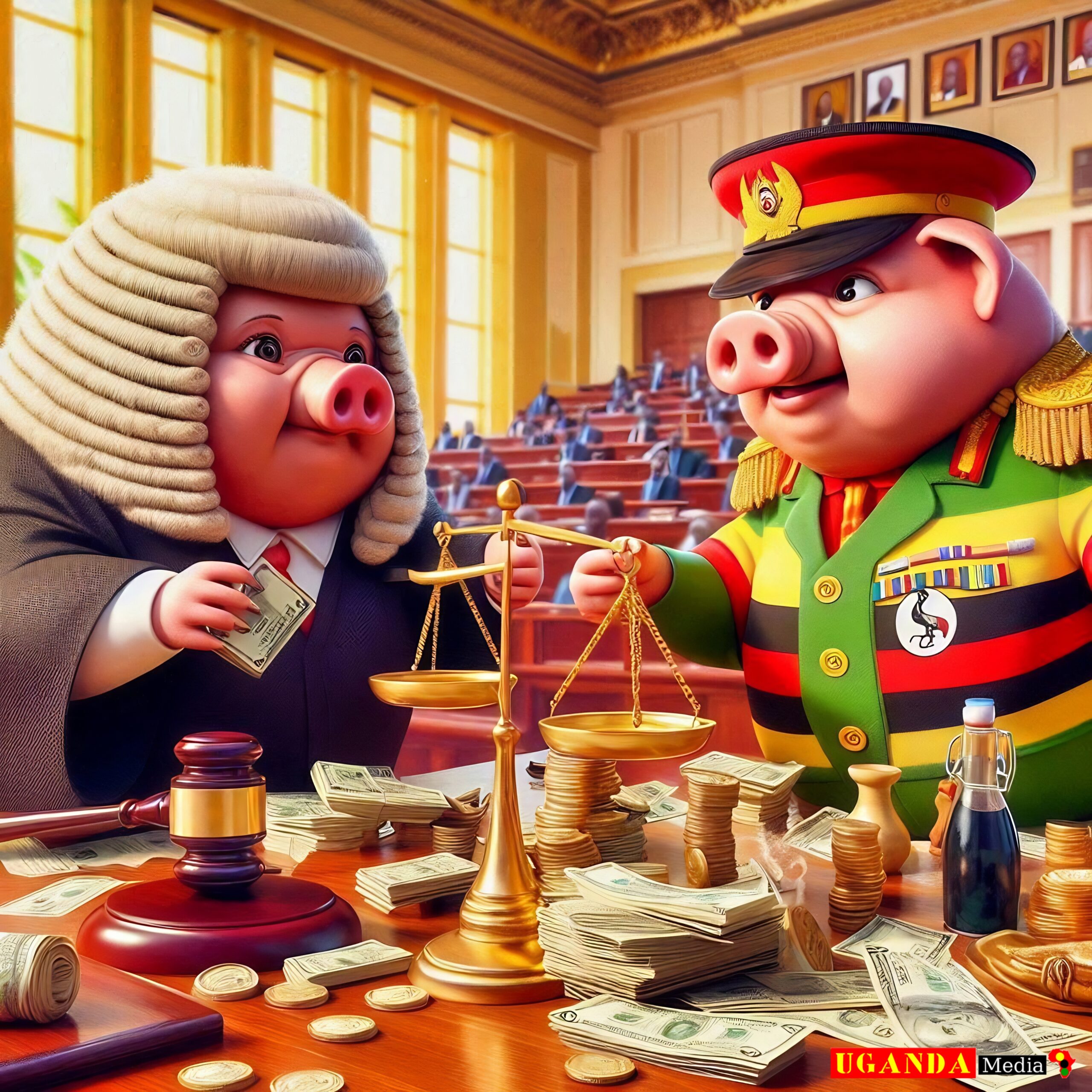
Inside these hallowed halls, far removed from the squalor and struggle of everyday life, Uganda’s most grotesque theatre played out nightly. For decades, this chamber had served as both stage and script for bribery, betrayal, and brazen theft—all masquerading as patriotism. Debates about policy were rare; discussions about kickbacks were routine. Laws passed not because they benefitted the people but because they lined pockets. This was no parliament—it was The House of Deals.
Whispers in the Wind
It was April 2025, and whispers rippled through Kampala like wind rustling through banana leaves. The latest scandal had emerged, sending shockwaves across the city. Shs 100 million—each MP had pocketed it. Not for roads or schools or hospitals, but because DictatorYoweri Museveni deemed it necessary to “safeguard sovereignty.” The phrase rolled off his tongue so smoothly, one might have mistaken it for wisdom rather than the euphemism it truly was: a bribe wrapped in nationalistic ribbons.
At roadside stalls, vendors shook their heads in disbelief. “Sovereignty?” scoffed Auntie Rose, slapping dough onto her greasy griddle. “If this is sovereignty, then why does my son still sleep hungry every night?”
Her customers nodded grimly, though some couldn’t help but chuckle at her theatrics. Humour, after all, was how many coped with despair. Yet beneath the laughter lay a simmering rage—a collective fury directed at those who dared call themselves leaders while robbing the very people they claimed to serve.
The Night of the Handshake
The payouts themselves were conducted with almost ceremonial precision. On Monday evening, MPs gathered discreetly in top-floor offices within Parliament, clutching briefcases and duffel bags. Others picked up their shares from nearby ministries or private residences in upscale Nakasero, known for housing government elites. Opposition MPs, too, joined the feeding frenzy, proving that principles could be bartered when the price was right.
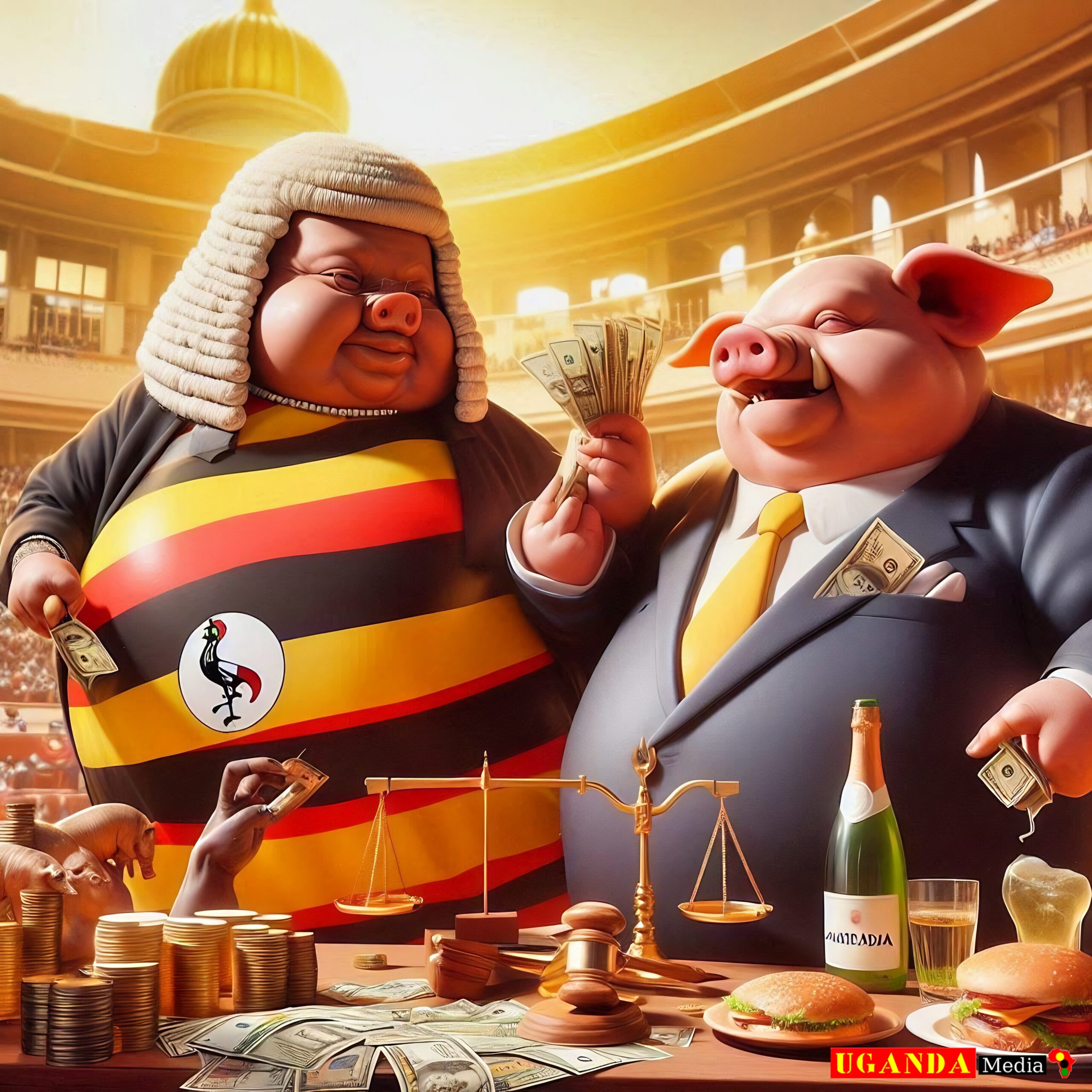
Hon. Moses Kato, MP for Buyaga East, arrived late, sweating profusely despite the air conditioning. He scanned the room nervously before approaching Chief Whip Hamson Obua, who greeted him with a knowing smile.
“All set?” Obua asked, sliding a thick envelope across the desk.
Kato hesitated briefly, glancing around the opulent office. Then, with a resigned sigh, he shoved the envelope into his bag without counting it. “For the family,” he muttered under his breath, though no one believed him.
Outside, Kampala’s streets buzzed with activity. Boda-boda riders zipped through traffic, dodging potholes and pedestrians alike. Street vendors hawked everything from roasted maize to pirated DVDs, their voices rising above the din of car horns and blaring radios. Life went on, oblivious—or perhaps indifferent—to the moral decay festering inside Parliament’s marbled halls.
The Justification Game
Back in State House, Museveni watched the chaos unfold with detached amusement. To him, this was not corruption—it was strategy. A masterstroke designed to keep his enemies close and his allies closer. He understood human nature better than anyone: greed trumped morality every time.
At a private luncheon, he addressed a group of loyalists, leaning back in his chair with the practiced ease of a storyteller spinning yarns around a campfire. “Let no one deceive you,” he said, his voice carrying both authority and amusement. “This government will never fight looting. It cannot. To fight it would be to destroy itself.”
His guests chuckled nervously, unsure whether to applaud or recoil. Dictator Museveni smiled knowingly. Let the masses protest, let the intellectuals pontificate—he held the strings, and they danced accordingly.
Chapter 1: The Easter Package
The night was thick with the scent of rain-soaked earth and the faint hum of generators powering streetlights that flickered like dying embers. In Kampala, where shadows danced between crumbling colonial-era buildings and shiny new glass towers, an unholy procession unfolded under the cover of darkness. It was April 7th—Easter weekend—and the mood in the air felt both sinister and surreal.
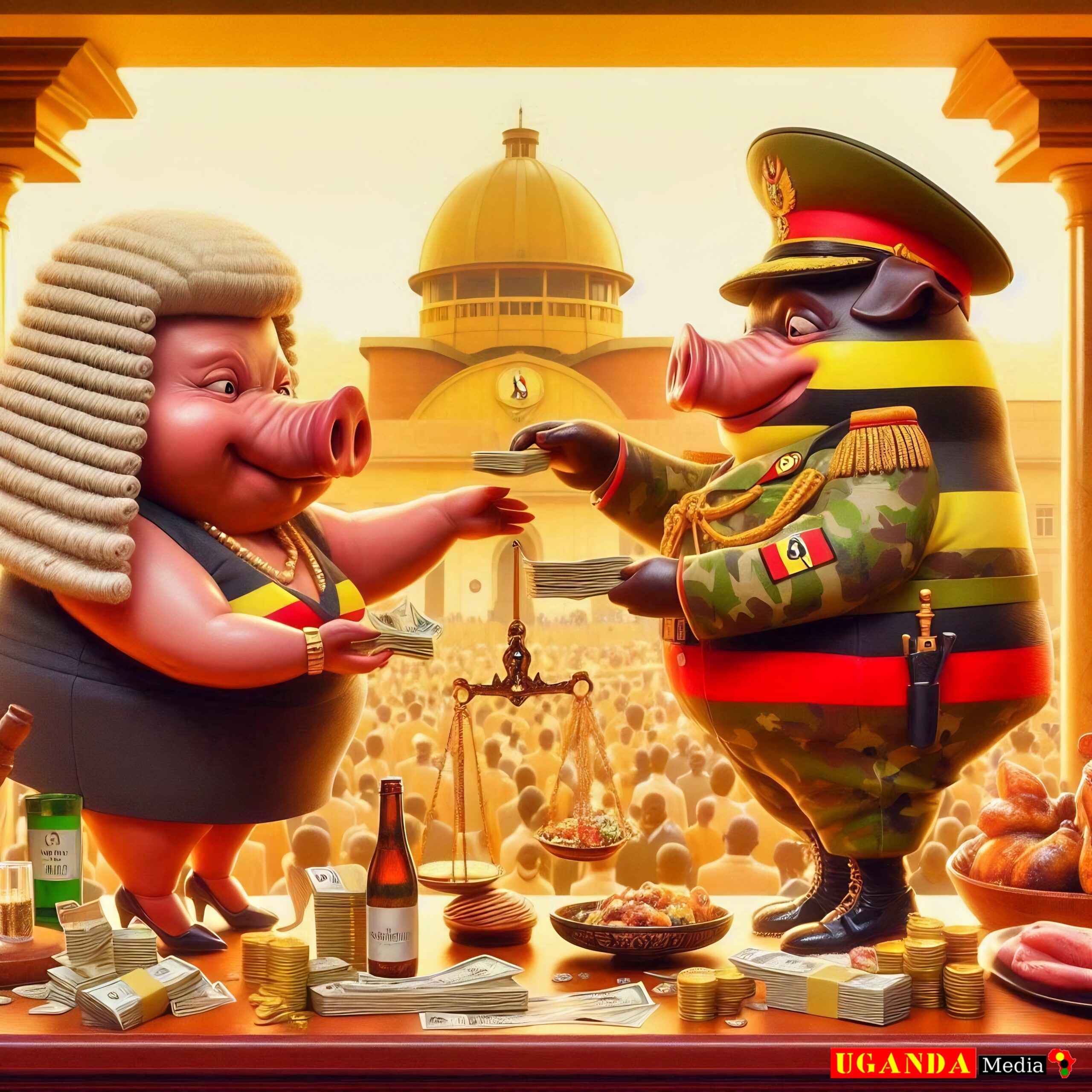
Scene One: A Midnight Pilgrimage
At precisely 8 p.m., a convoy of vehicles began snaking its way through Nakasero’s labyrinthine streets, their headlights dimmed as if ashamed to be seen. First came the battered Toyota Premios, their paint jobs faded from years of wear on Uganda’s pothole-ridden roads. Behind them trailed sleek Land Cruisers, their tinted windows reflecting the orange glow of sodium lamps. Inside each vehicle sat Members of Parliament—some nervous, others giddy—all bound for what they called “the Easter Package.”
The destination? A nondescript office building tucked behind Parliament, its walls adorned with peeling posters promoting government health campaigns (“End Malaria!” “Family Planning Saves Lives!”) that now seemed bitterly ironic.
As MPs stepped out of their cars, some exchanged awkward glances; others greeted one another with forced smiles. They were ushered inside by aides who moved like ghosts, their faces blank masks concealing any trace of emotion. No names were spoken aloud—only nods and gestures guided them upstairs to a room lit by harsh fluorescent lights.
There, on a long wooden table, lay stacks of brown envelopes. Each bulged obscenely with cash—Shs 100 million per parcel, crisp banknotes bundled neatly and wrapped in cellophane. An aide stood at the head of the table, his hands clasped tightly together as though praying for absolution. Without uttering a word, he gestured for the first MP to approach.

One by one, they filed forward. Some hesitated, glancing over their shoulders as if expecting divine retribution to strike. Others lunged greedily, snatching their envelopes and stuffing them into briefcases or handbags before retreating hastily. None dared ask questions—not about the source of the money, nor its purpose. To question would be to risk exclusion from this obscene ritual.
By 9 p.m., the queue had dwindled, but the operation continued well into the early hours of April 8th. For those unable to attend the initial distribution, alternate pickup points had been arranged: a residence in upscale Nakasero known for housing top officials, and another near Parliament itself. Here too, MPs arrived in twos and threes, slipping in and out like thieves avoiding detection.
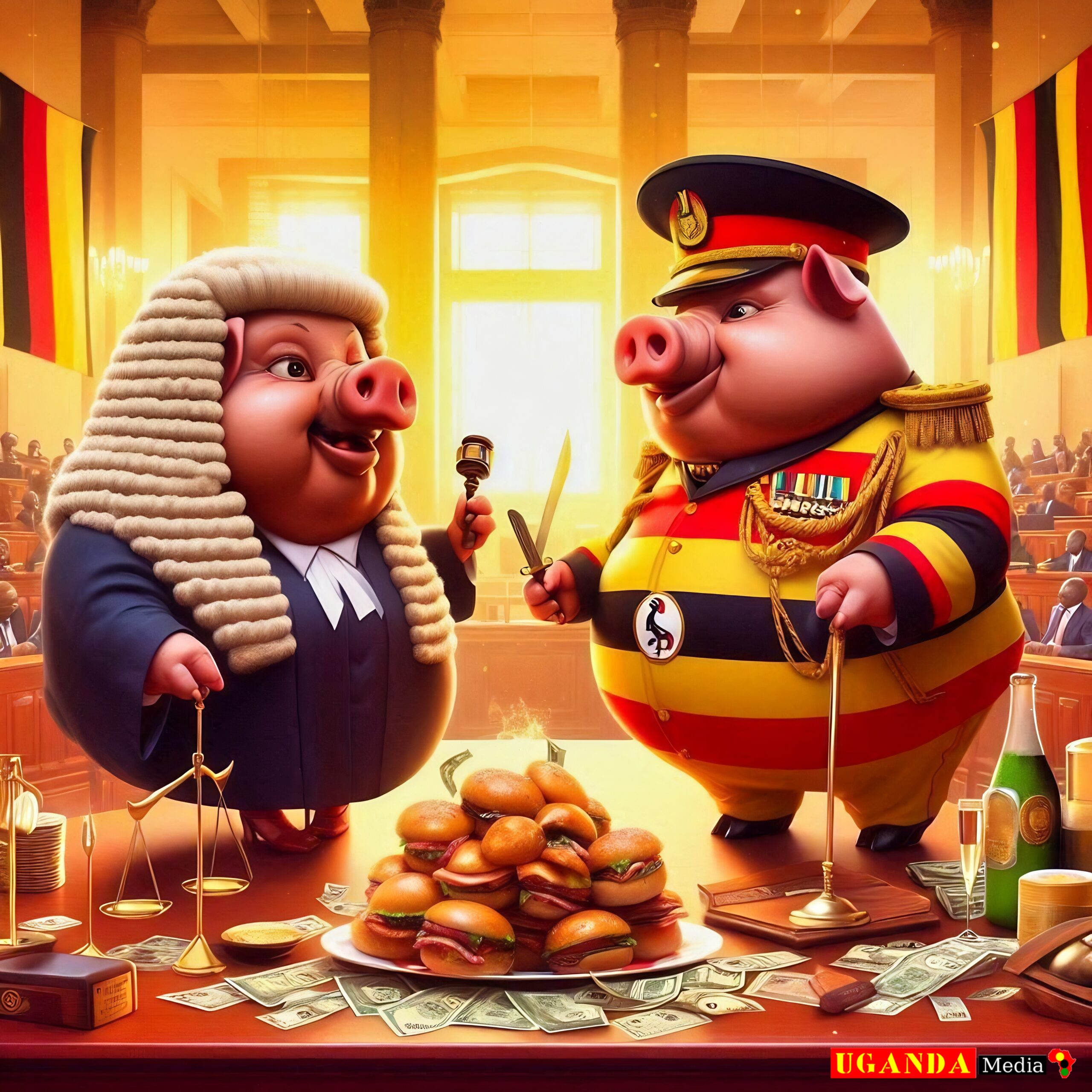
Scene Two: Social Media Meltdown
By sunrise, screenshots flooded social media platforms. One image showed a grinning MP holding up a wad of cash against a backdrop of luxury curtains, while another captured two legislators posing cheekily with their brown envelopes. Hashtags proliferated faster than wildfire:
- #ParliamentOfPlunder
- #BriberyBizAsUsual
- #EasterPackageGate
Comments ranged from outrage to dark humor:
“Jesus rose from the dead today, but our MPs are busy resurrecting corruption!” quipped one user.
“What’s next? Christmas bonuses for passing budgets?” joked another, though the laughter rang hollow.
Journalists scrambled to piece together the story, but sources remained tight-lipped. Anonymous tips trickled in, revealing details of the payouts and speculating on their intent. Was it to secure votes for upcoming legislation? Or simply a bribe to maintain loyalty within Museveni’s sprawling patronage network?
Amidst the chaos, one viral tweet summed it all up perfectly:
“In Uganda, we don’t elect leaders—we hire actors for a theatre of shame.”
Scene Three: Dr. Adonyo’s Reckoning
Not everyone played along willingly. Dr. Lumumba Adonyo
, MP for Palabek South, stormed into Speaker Anita Among’s chambers the following morning, clutching his unopened envelope like evidence at a murder trial. His voice trembled with indignation as he demanded answers.
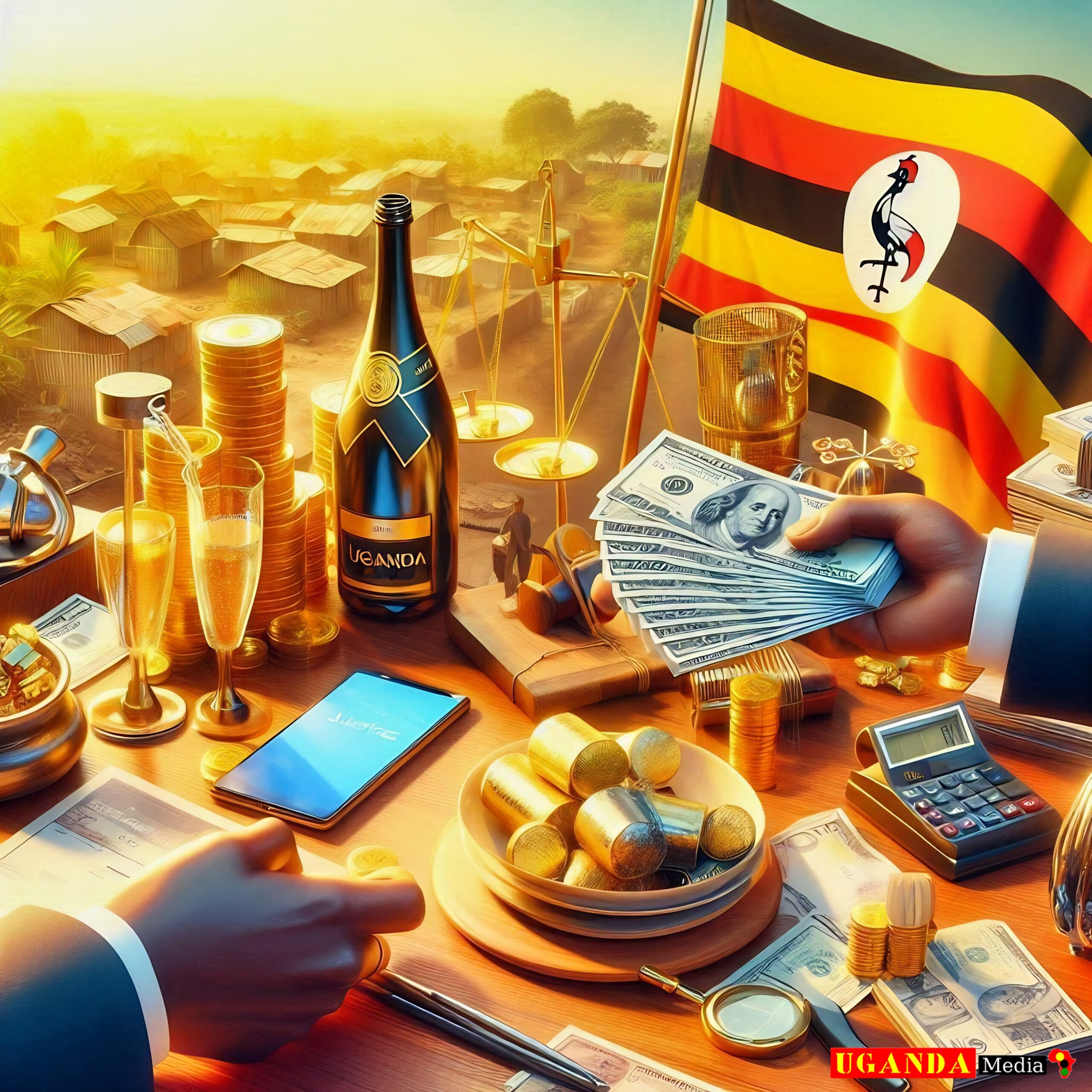
“This is not governance!” he thundered, slamming the envelope onto her desk. “This is extortion! You cannot justify stealing from taxpayers in the name of safeguarding sovereignty!”
Among raised an eyebrow, her expression unreadable. “Dr. Adonyo, ” she said coolly, “you’re making a spectacle of yourself. This matter has already been settled.”
But Adonyo refused to back down. He marched straight to the press gallery, where reporters eagerly awaited his statement. Cameras flashed as he held up the envelope for all to see, declaring, “I will not be complicit in this theft! I return my share to the people of Uganda.”
His defiance earned him fleeting admiration—but also swift retaliation. Within hours, he was summoned before a parliamentary ethics committee, accused of tarnishing the institution’s reputation. Colleagues jeered as he defended himself, their laughter echoing cruelly in the chamber. Humiliated, Adonyo
eventually issued a public apology—but late that night, alone in his study, he stared at the sealed envelope still sitting untouched on his desk. His wife watched silently from the doorway, her eyes filled with sorrow.
“They’ve broken you,” she murmured softly. “And for what? So they can sleep soundly knowing they’ve bought your silence?”
Adonyo buried his face in his hands, unable to respond.
Scene Four: The Whistleblower’s Dilemma
Meanwhile, hidden away in a cramped office on the ground floor, a junior clerk named Moses Ojok observed everything. From his perch beside a dusty filing cabinet, he’d witnessed the entire operation unfold—the furtive arrivals, the hushed exchanges, the aides’ guilty stares. Every detail seared itself into his memory.

That evening, as he trudged home through Kampala’s crowded streets, Moses wrestled with his conscience. Should he expose the truth? Doing so could cost him his job—or worse. But staying silent made him complicit, another cog in the machine of corruption.
Back in his tiny flat, Moses pulled out his laptop and began typing. Names, dates, amounts—he documented everything meticulously, attaching photos secretly snapped during the payout. Then, with trembling fingers, he uploaded the file to a whistleblower website.
Within minutes, the internet exploded. Across Uganda, citizens devoured the revelations, their anger reigniting like flames fanned by fresh wind. Protests erupted outside Parliament, led by activists chanting slogans borrowed from Moses’ own words:
“Corruption kills! Justice delayed is justice denied!”
Yet even as hope stirred among ordinary Ugandans, Moses knew the battle was far from over. Powerful men whispered in shadowy corners, deals were struck, and promises made. By week’s end, the scandal had vanished from headlines, buried beneath newer distractions.
Still, Moses allowed himself a small smile. Seeds of change had been planted. And sometimes, even the smallest seeds grow into mighty trees.
Epilogue: Shadows and Light
In the weeks that followed, life returned to normal—or rather, to the twisted version of normalcy that defined modern Uganda. MPs resumed their roles as rubber stamps, passing laws crafted not for the benefit of citizens but for the enrichment of elites. Dictator Museveni dismissed the controversy with characteristic nonchalance, calling critics “mischief-makers” bent on destabilizing the nation.
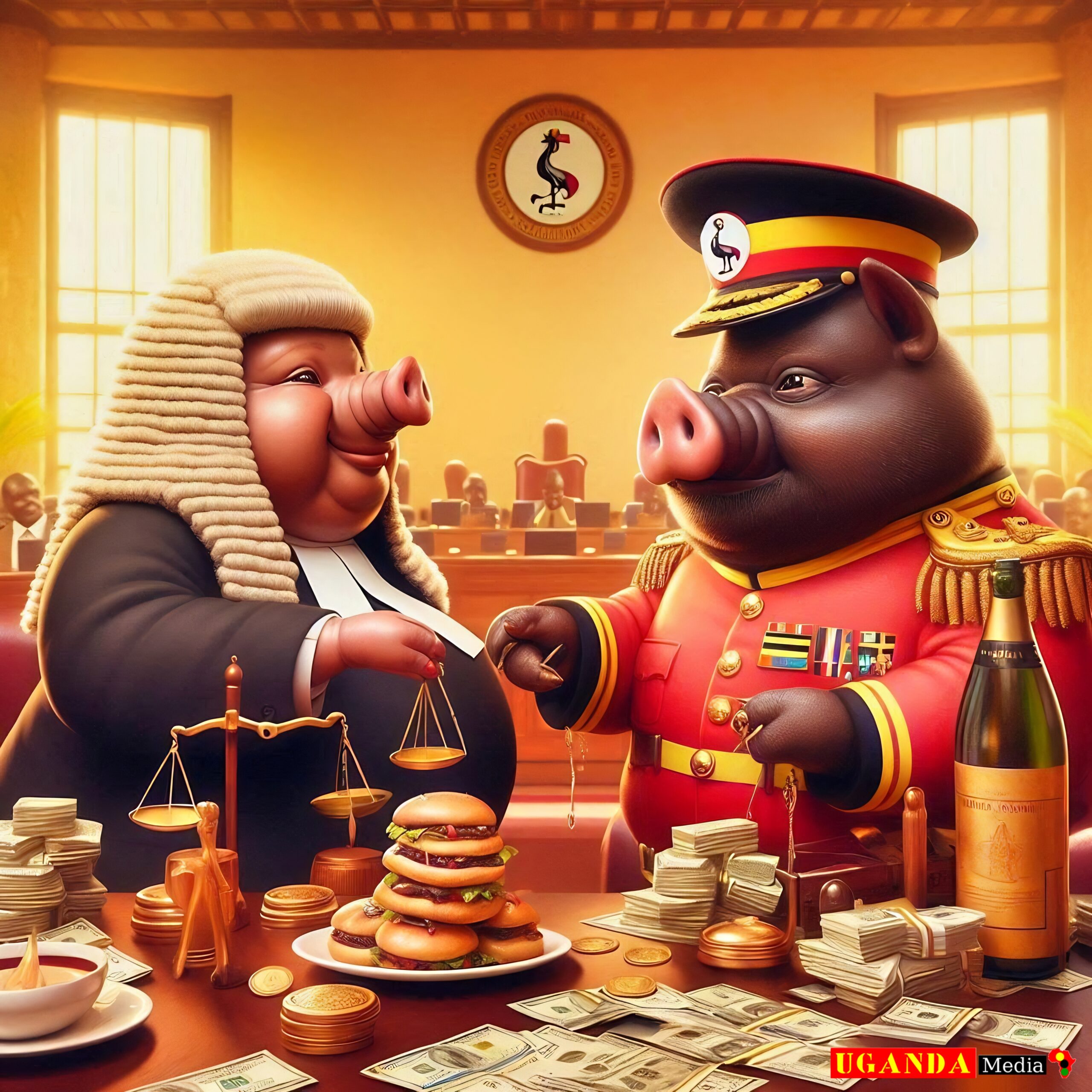
Yet amidst the despair, something remarkable emerged. Artists painted murals depicting hyenas feasting on carcasses labelled “Taxpayer Funds.” Musicians composed songs decrying corruption, their lyrics sharp and unflinching. Comedians turned the scandal into biting satire, mocking MPs with punchlines that stung like whips.
For the first time in years, ordinary Ugandans dared to dream of accountability. Perhaps, just perhaps, the Easter Package would mark not the end of integrity but the beginning of a reckoning. After all, even in the darkest nights, dawn always arrives—slowly, painfully, but inevitably.
And when it did, it would bring fire.

Chapter 2: The Anatomy of Corruption
A Ritualistic Dance of Greed
Corruption in Uganda’s Parliament wasn’t merely a flaw—it was a tradition, an art form passed down like folktales from one generation of legislators to the next. It had become almost ceremonial, as predictable as the rainy season and twice as destructive. Every few years, a fresh scandal would erupt, each more audacious than its predecessor, yet somehow always cloaked in plausible deniability.
In 2005, MPs gleefully pocketed Shs 5 million each to remove presidential term limits—a move that transformed Yoweri Museveni into a modern-day monarch without a crown. By 2017, they upped the ante, snatching Shs 29 million apiece to abolish age caps on leadership, ensuring their ruler remained untouchable even as he approached his twilight years. And now, in 2025, they brazenly claimed Shs 100 million per head, not because they needed it (though they certainly acted as if they did), but because it was expected—almost demanded—of them.
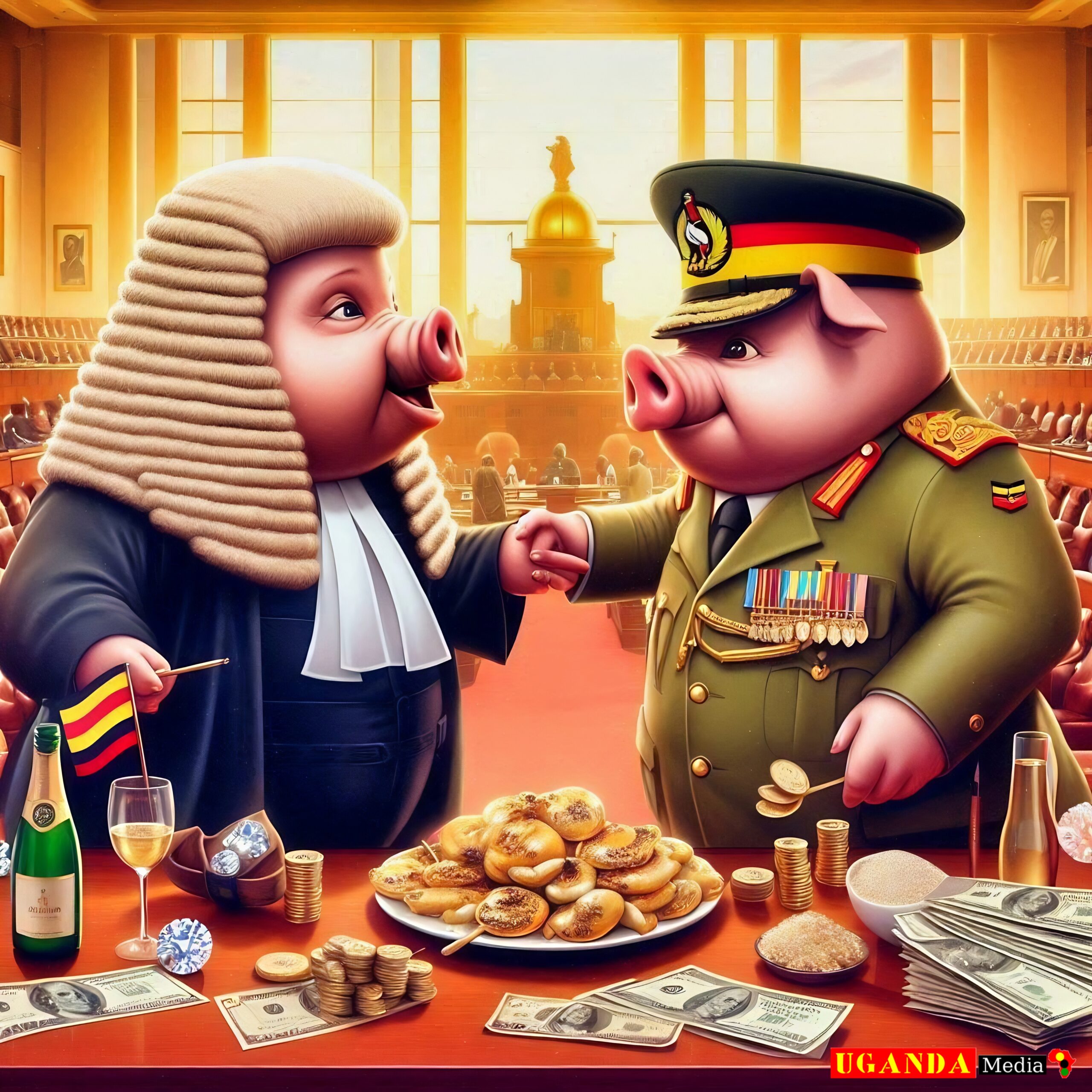
It was not just bribery; it was a grotesque ballet choreographed by those who held the purse strings. Each payment came with a wink and a nod, a silent understanding that loyalty could be purchased, dignity auctioned off, and principles left to rot in the sun.
Cracks Beneath the Gilded Surface
Yet behind closed doors, cracks began to show. Not all MPs were content to play along with this macabre charade. Wilfred Niwagaba, the perpetually rumpled Shadow Attorney General and self-proclaimed thorn in the regime’s side, nursed his grievances over lukewarm coffee at a dingy Kampala café. Across from him sat Sarah Mutesi, a sharp-eyed journalist whose pen had earned her both accolades and enemies.
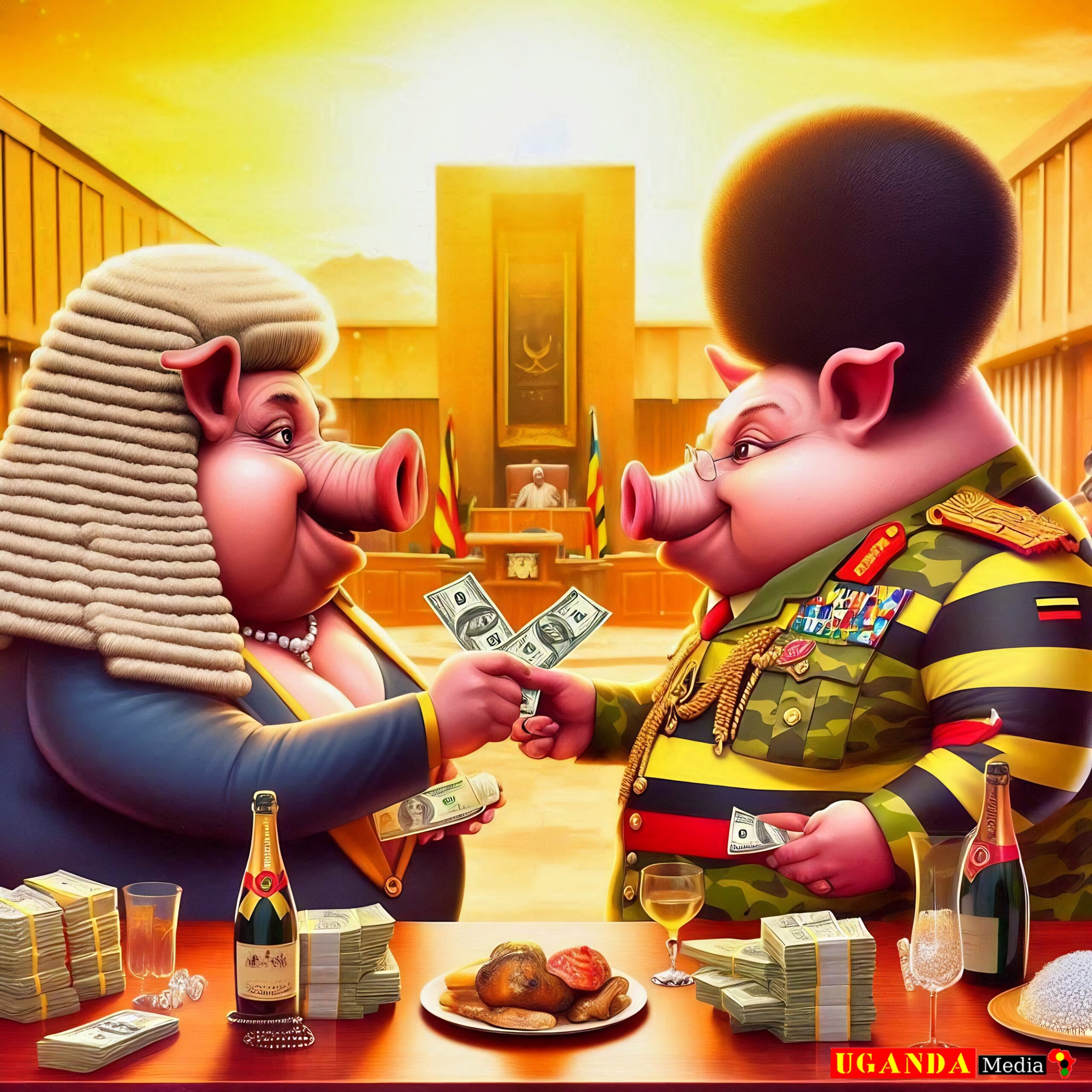
“They think we’re blind,” Niwagaba growled, stirring sugar into his mug until the liquid turned murky brown. “They think we don’t see how they manipulate us, how they buy our silence. But we do. We just don’t know how to stop them.”
Sarah leaned forward, her notebook poised like a weapon. “So why call it ‘institutionalised theft’? Isn’t that giving them too much credit?”
Niwagaba chuckled bitterly. “Theft implies there’s something worth stealing. What we have here is plundering—not of gold or diamonds, mind you—but of hope itself. They steal our future, our children’s futures, and serve it back to us wrapped in lies about sovereignty and prosperity.”

His words hung heavy in the humid air, mingling with the scent of stale bread and diesel fumes wafting through the open window. Outside, Kampala bustled with life: boda-boda riders weaving recklessly between cars, street vendors hawking everything from roasted maize to pirated DVDs, and children playing football amidst puddles left by last night’s rain. Life went on, oblivious—or perhaps indifferent—to the moral decay festering inside Parliament’s marbled halls.
Laughter in the Halls of Power
Meanwhile, within those very halls, laughter echoed off gilded walls. MPs gathered in clusters, comparing notes on how best to spend their newfound wealth. Some planned lavish weddings for their daughters; others dreamed of buying second homes or importing luxury vehicles duty-free. A few even joked about starting businesses, though none dared suggest investing in anything productive for the nation.
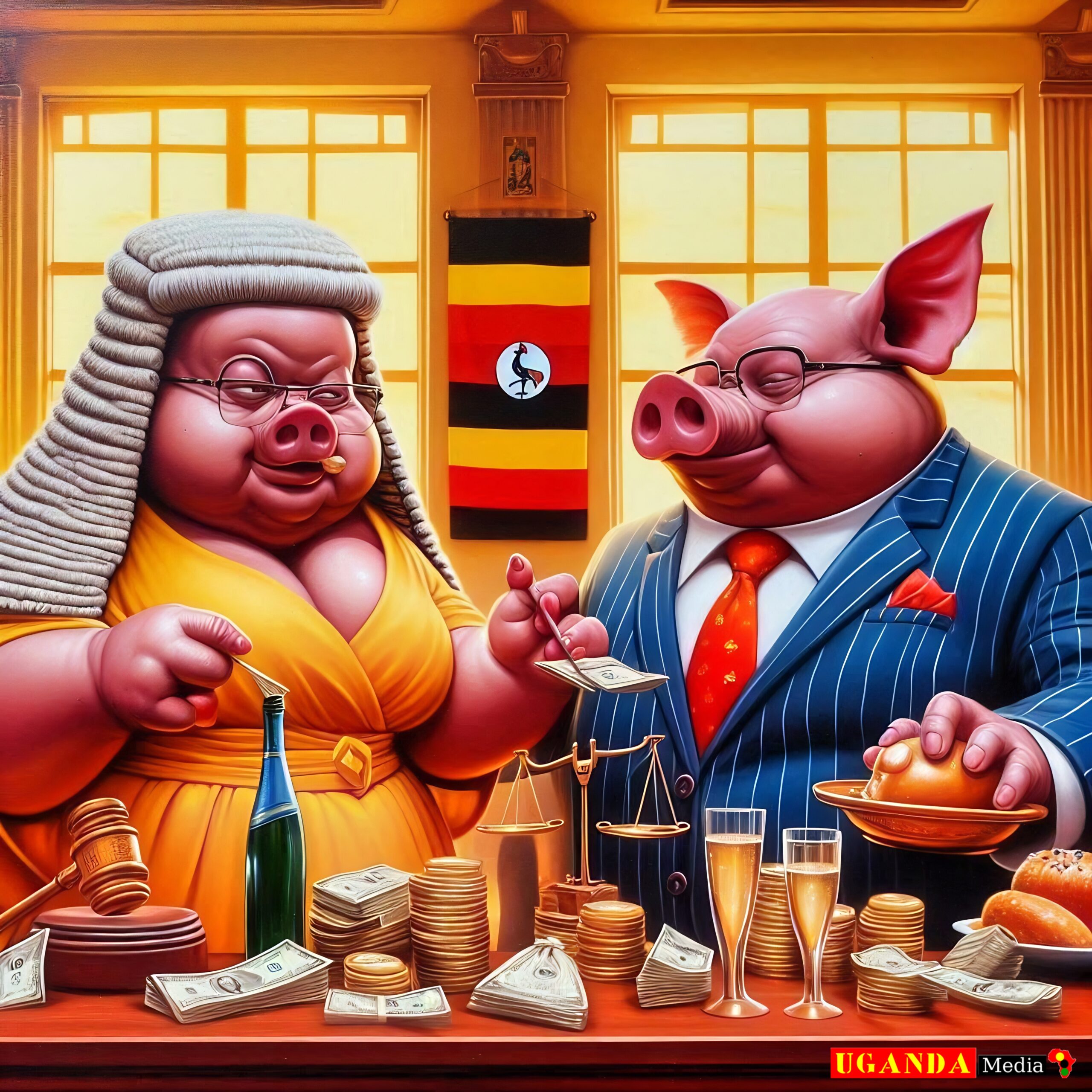
“Who needs integrity when you’ve got cash?” quipped Hon. Moses Kato, MP for Buyaga East, slapping his colleague on the back. His joke elicited raucous laughter, though beneath the mirth lay a kernel of truth too painful to acknowledge.
Hon. Florence Nakayenze, MP for Rubaga North, chimed in, her voice dripping with sarcasm. “Integrity won’t pay my school fees, will it? Besides, who are these so-called idealists criticizing us? Let them come sit where we sit, feel the pressure we feel. Then we’ll see how righteous they remain.”
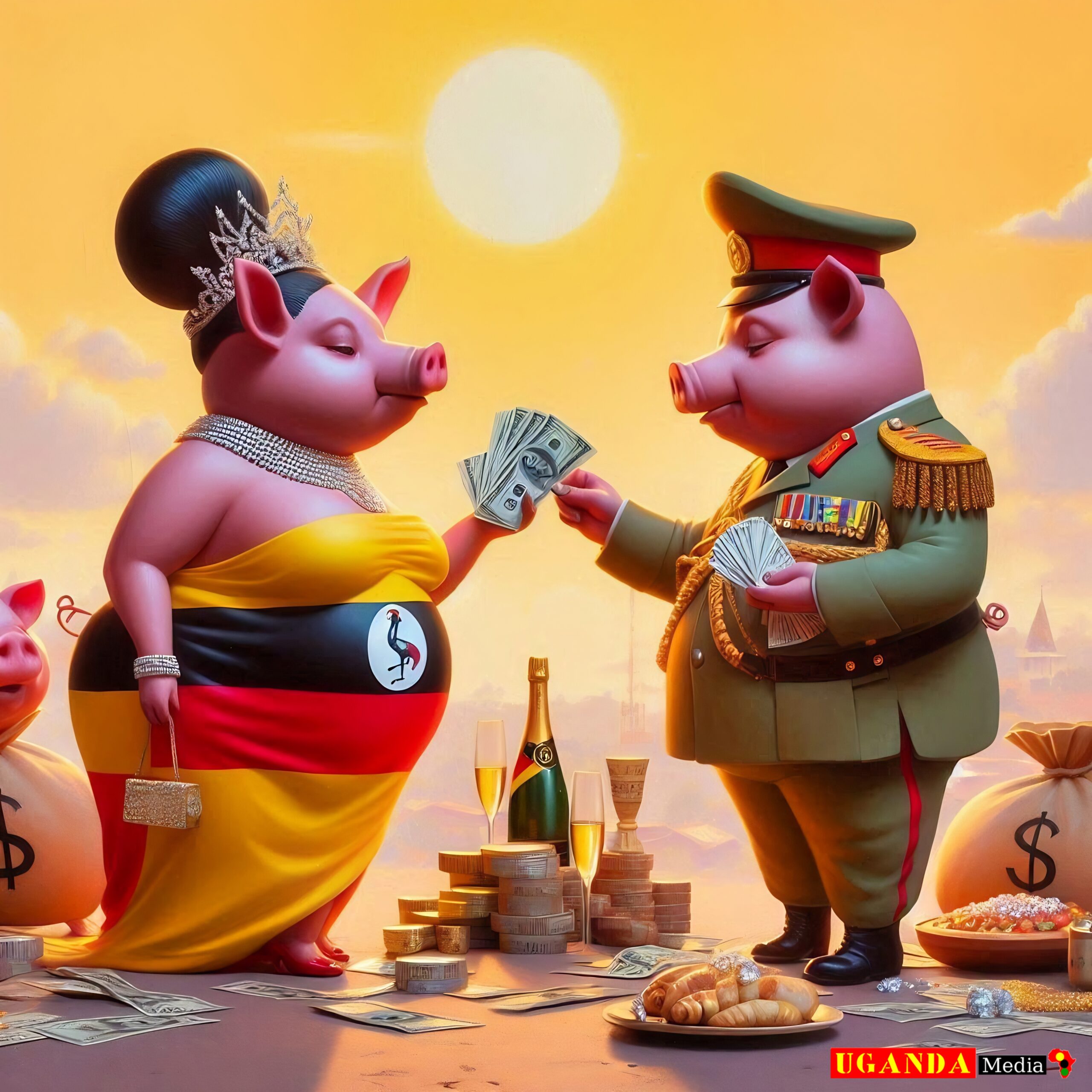
Her words resonated with many. After all, who among them hadn’t faced mounting debts, relentless family demands, or the ever-present spectre of unemployment after leaving office? Accepting bribes wasn’t just greed—it was survival, packaged neatly as pragmatism.
Voices of Dissent
But dissent simmered quietly, bubbling beneath the surface like molten lava threatening to erupt. Dr. Lumumba Adonyo
, the ill-fated MP from Palabek South, haunted the corridors of Parliament long after his forced apology. Though silenced publicly, he whispered warnings to anyone willing to listen.
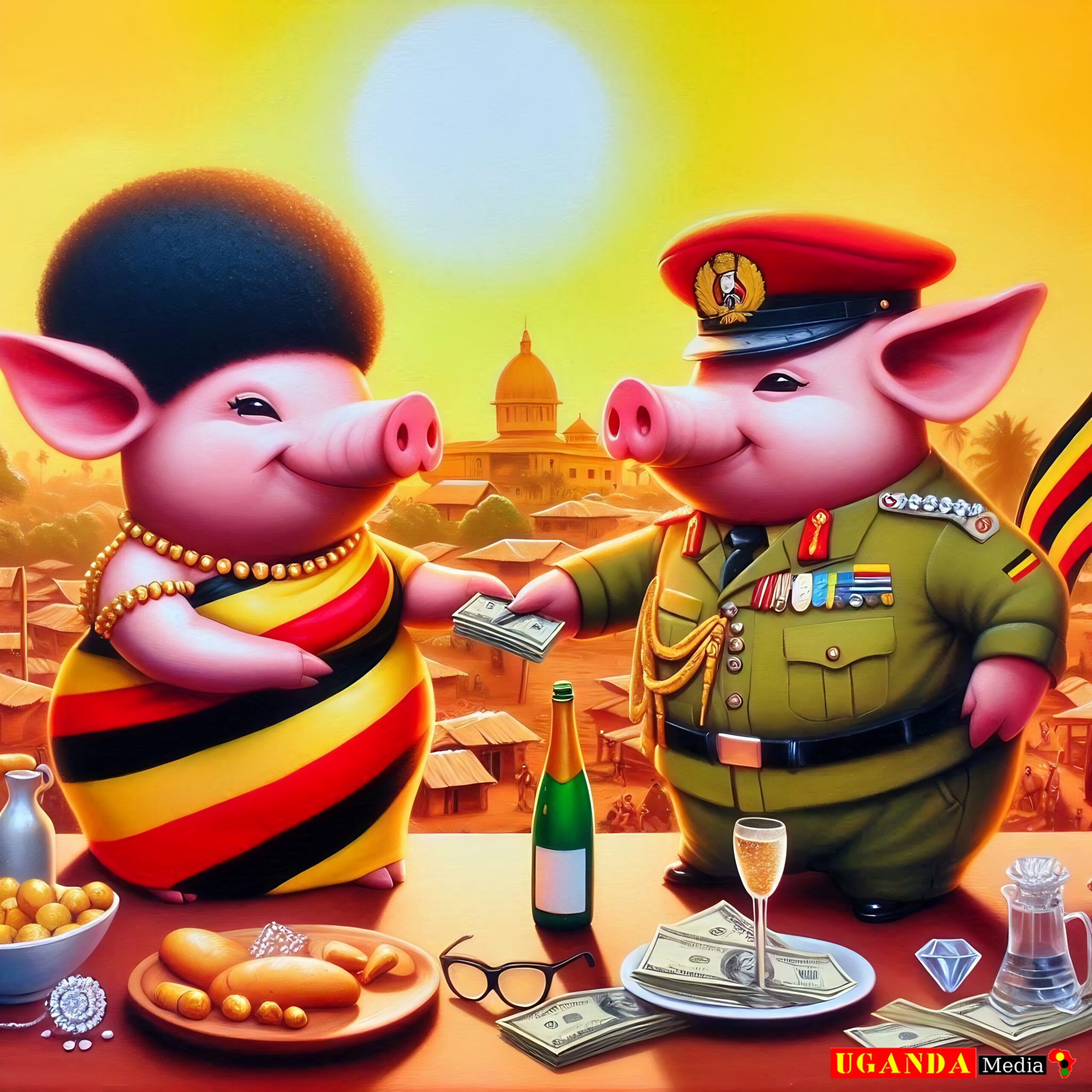
“This isn’t governance,” he muttered during a rare moment of candour. “This is gangsterism dressed in suits. We’ve sold our souls for silver coins, and for what? So Museveni can build another palace? So Among can buy another mansion?”
His words found fertile ground in unexpected places. Young parliamentary aides, disillusioned by what they witnessed daily, began sharing stories online under pseudonyms. Anonymous accounts sprang up on social media, exposing secret meetings, leaked documents, and damning photographs of cash-stuffed envelopes changing hands. Memes mocking MPs flooded timelines, their humour masking deep-seated anger.
One particularly biting meme depicted Speaker Among seated atop a throne made of moneybags, flanked by grinning MPs holding piggy banks instead of sceptres. The caption read: “Parliament: Where Dreams Go to Die.”
A Nation Watches—and Waits
Beyond Parliament’s gates, ordinary Ugandans watched with a mixture of disbelief, despair, and dark amusement. In marketplaces, bus parks, and roadside bars, conversations revolved around the latest scandal. Auntie Rose, the fiery chapati vendor, delivered scathing verdicts between spatula flips.

“These MPs are worse than locusts!” she declared, slamming dough onto her greasy griddle. “At least locusts leave something behind. These ones take everything and give nothing!”
Her customers nodded solemnly, though some couldn’t help but chuckle at her theatrics. Humour, after all, was a coping mechanism—a way to endure the absurdity of living in a country where corruption thrived unchecked.
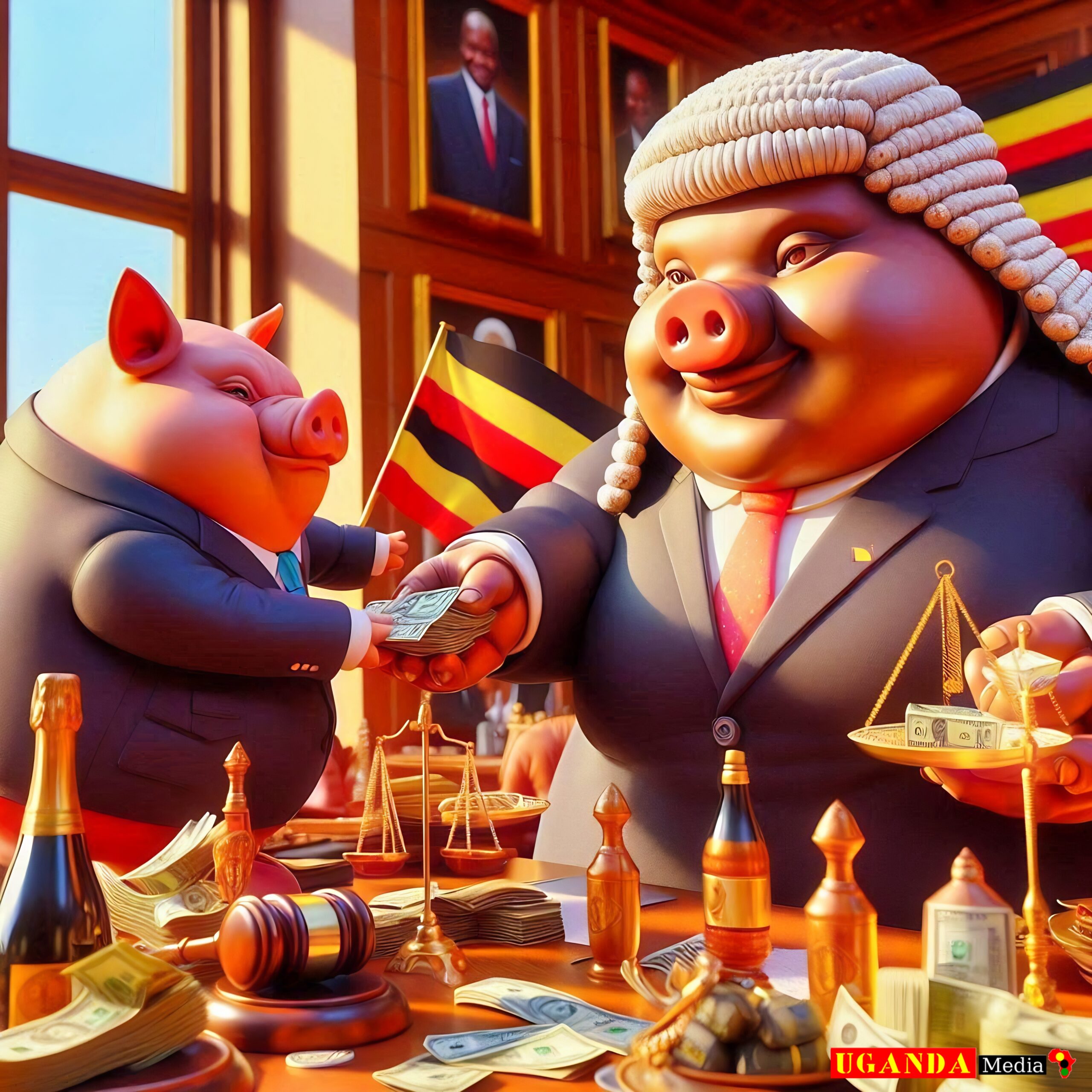
Yet beneath the laughter lurked a growing sense of unease. For every joke about MPs stuffing mattresses with cash, there was a sobering reminder of broken promises: crumbling schools, overcrowded hospitals, roads riddled with potholes. People wondered aloud whether things would ever change—or if they were doomed to repeat history again and again.
An Uncertain Future
As dusk fell over Kampala, casting long shadows across its chaotic streets, the city seemed suspended between hope and resignation. Lights flickered in Parliament’s windows, illuminating faces flushed with triumph—or guilt. Outside, protesters gathered in small groups, chanting slogans and waving placards emblazoned with slogans like “Return Our Money!” and “No More Deals!”
Among them stood Sarah Amito, her pen scribbling furiously in a weathered notebook. She glanced up occasionally, scanning the crowd for familiar faces. Her article on the anatomy of corruption would run tomorrow, she decided, alongside Wilfred Niwagaba’s incisive quotes. Perhaps it wouldn’t topple regimes or spark revolutions—but it might ignite a spark, however faint, in hearts yearning for justice.
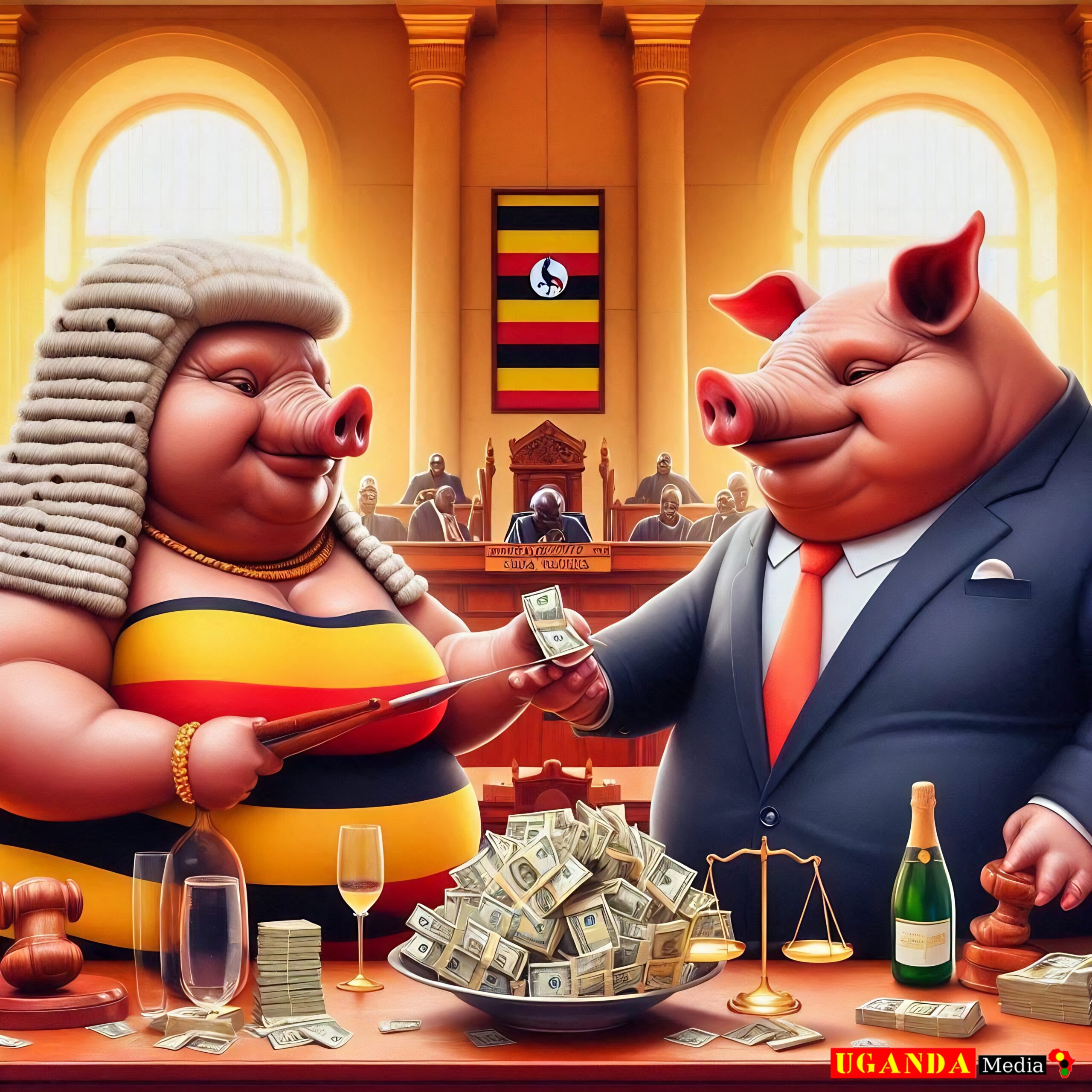
For now, though, Uganda remained trapped in its cycle of graft and grievance, its people clinging to dreams deferred while its leaders danced to the discordant tune of power and profit. Whether the music would stop anytime soon—or crescendo into chaos—remained to be seen.
And so, the Pearl of Africa teetered precariously on the edge of transformation, waiting for someone brave enough to tip the scales.
Chapter 3: The Watchdogs Bark
A Nation’s Silent Fury
Outside the gilded walls of Parliament, where deals were brokered and bribes exchanged with surgical precision, Uganda seethed. In roadside stalls filled with sizzling meat skewers and bubbling pots of posho, in bustling matatu parks where drivers honked incessantly and hawkers shouted over the din, conversations crackled with venomous energy. Ordinary citizens—those who bore the brunt of corruption’s weight—spoke not in whispers but in furious tones that echoed through Kampala’s humid air.
“How dare they?” one man spat, his face contorted with rage as he read a newspaper headline about the latest scandal. “They steal from us and call it governance? These thieves wrap themselves in the flag while lining their pockets with our blood money!”
Another chimed in, shaking her head bitterly. “Peace and sovereignty, my foot! What peace do we have when mothers bury their children because hospitals lack medicine? What sovereignty is this when farmers starve while coffee profits vanish into thin air?”
The anger was palpable, a collective wound festering beneath the surface of daily survival. Yet for all their fury, many felt powerless. How could they fight against a system so entrenched, so insidious, that resistance seemed futile?
Sarah Amito Takes the Stage
One evening, under the flickering glow of streetlights in Freedom Square, a young activist named Sarah Amito climbed onto a makeshift podium constructed from wooden crates and scrap metal. Her slight frame belied her fierce determination; she carried herself like a warrior ready to take on Goliath armed only with words.
“Listen to me!” she cried, her voice slicing through the cacophony of car horns and distant chatter. She held aloft a crumpled newspaper bearing the headline “MPs Receive Shs 100 Million Each Amid Budget Crisis.” The crowd hushed, drawn in by her passion.
“They call it safeguarding sovereignty,” she declared, her voice rising with every syllable. “I call it daylight robbery! Our children die in hospitals without medicine while these vultures feast on our taxes. Our roads are death traps while they cruise in luxury cars imported duty-free. Enough is enough!”
The crowd erupted, fists pumping defiantly toward the starless sky. Cheers mingled with jeers, and chants of “Thieves must go!” reverberated across the square. For a moment, unity burned brightly among the masses—a rare flame in a nation divided along tribal lines and regional grievances.
But even as the rally reached its crescendo, Sarah couldn’t ignore the doubt gnawing at her gut. Would tonight’s fire translate into action—or fizzle out like so many protests before it? Museveni’s regime thrived on division, pitting tribes against tribes, regions against regions, ideologies against ideologies. Unity felt like a mirage, shimmering tantalizingly close yet always just out of reach.
The System Strikes Back
By morning, the authorities had struck back with characteristic efficiency. Police arrived at Freedom Square before dawn, dismantling the makeshift podium and arresting anyone lingering nearby. A stern-faced officer confiscated copies of the offending newspaper, citing “national security concerns.” By midday, state-controlled media aired clips of government ministers dismissing the protest as “misguided youth misled by foreign agitators.”
In the opulent offices of State House, Dictator Museveni sat flanked by advisors, sipping tea as reports filtered in. He listened intently, nodding occasionally but betraying no emotion. To him, such unrest was merely background noise, an unavoidable nuisance rather than a genuine threat. After decades in power, he knew better than anyone how to quell dissent without appearing heavy-handed.
“The watchdogs bark, Mr. President,” remarked Chief Whip Hamson Obua with a smirk, referring to activists like Sarah. “But they cannot bite.”
Museveni chuckled dryly. “Let them bark. As long as they don’t bite, we are safe.”
The Watchdogs Among Us
Yet not all watchdogs were toothless. Across Kampala, journalists, whistleblowers, and grassroots organizers worked tirelessly to expose the rot within. One such figure was Moses Kato, a veteran reporter known for his dogged pursuit of the truth. Operating out of a cramped office above a noisy bar, Moses pieced together evidence of corruption with the meticulousness of a forensic scientist.
His latest investigation focused on the mysterious source of the Shs 100 million payouts. Documents obtained through anonymous leaks suggested the funds originated from undisclosed foreign loans funnelled directly into State House coffers—a revelation that could embarrass both local elites and international donors alike.
“This isn’t just theft,” Moses muttered to himself late one night, surrounded by stacks of papers and empty coffee cups. “It’s betrayal. They’ve sold our future to the highest bidder.”
He planned to publish his findings in the next edition of Free Uganda Critical Media, Uganda’s most respected investigative magazine. But deep down, he knew the risks. Journalists who crossed the wrong people often disappeared, their stories buried alongside them. Still, Moses pressed on, driven by a stubborn belief that someone—anyone—needed to hold the powerful accountable.
A Mother’s Lament
Meanwhile, in a quiet corner of Kampala, a mother named Esther Nakato nursed her feverish child in a dimly lit room. The hospital had turned them away earlier that day, citing a shortage of antibiotics. Now, as her son’s breathing grew laboured, Esther prayed silently, tears streaming down her cheeks.
“Why must we suffer like this?” she whispered, clutching her rosary beads tightly. “Why does God allow such injustice?”
Her thoughts drifted to the MPs she’d seen on television, grinning smugly as they collected their payouts. She imagined confronting them, demanding answers. But what good would it do? They lived in a world far removed from hers, insulated by wealth and privilege.
As dawn broke over Kampala, Esther resolved to join the next protest, hoping against hope that her voice might somehow pierce the deafening silence of indifference. Perhaps, she thought, if enough mothers stood together, their cries would shake the foundations of power.
An Uneasy Calm
Days passed, and the initial fervour of Freedom Square faded into uneasy calm. Life returned to its chaotic rhythm: boda-boda riders zipped through traffic, vendors hawked mangoes and roasted maize, and children played football amidst puddles left by afternoon rains. But beneath the surface, discontent simmered, waiting for the right spark to ignite another uprising.
In the shadows, however, sinister forces prepared for battle. Surveillance teams monitored activists’ movements, compiling dossiers on potential troublemakers. Rumours spread of midnight arrests and interrogations conducted in undisclosed locations. Fear crept back into hearts once emboldened by defiance.
And yet, amid the darkness, glimmers of hope persisted. Activists like Sarah Namutebi refused to be silenced, their courage inspiring others to speak out. Journalists like Moses Kato continued digging, unearthing secrets meant to stay buried. Even ordinary citizens like Esther Nakato found strength in shared suffering, vowing to resist in whatever small ways they could.
For now, the balance tipped precariously between oppression and rebellion, despair and resilience. Whether Uganda would rise or fall depended on whether its people chose to remain watchdogs—or become wolves.
Epilogue: The Barking Turns to Growling
As Sarah stood on a new makeshift stage weeks later, addressing another crowd in Freedom Square, she noticed something different. This time, the faces staring back at her weren’t just angry—they were resolute. Determination replaced resignation, and resolve hardened eyes that had once been weary.
Perhaps, she thought, the watchdogs were finally learning to growl. And maybe, just maybe, the days of impunity were numbered.
Chapter 4: The President’s Gambit
The Chessboard of Power
In the opulent confines of State House, where crystal chandeliers glimmered faintly in the dim light and mahogany furniture gleamed with polished precision, Dictator Yoweri Museveni sat ensconced in his chair like a grandmaster surveying a chessboard. Outside, Kampala buzzed with unrest—protests erupted sporadically, journalists risked their lives to expose corruption, and ordinary citizens whispered curses against their leaders. But inside these gilded walls, all was calm.
To the dictator, the chaos outside wasn’t evidence of failure—it was proof of success. Each scandal, each bribe paid to an MP, was not merely theft; it was strategy. A calculated move designed to maintain control, to keep allies indebted and enemies neutralised. He understood human nature better than most: greed always trumped morality, especially when survival hung in the balance.
As he sipped his tea from delicate porcelain imported from China, Dictator Museveni reflected on decades of governance. What others called corruption, he saw as pragmatism. After all, how else could one hold together a nation so fractious, so divided along tribal and regional lines? Money, he reasoned, was the glue that bound Uganda—not ideals or promises of prosperity.
A Luncheon for Loyalists
Later that afternoon, Dictator Museveni hosted a private luncheon for his inner circle. The room brimmed with laughter and clinking glasses, though beneath the surface lay currents of unease. These were men—and a few women—who owed their fortunes to Museveni’s patronage. They had grown rich off government contracts, land deals, and lucrative positions within his administration. And they knew full well that their wealth came at a price.
“Let no one deceive you,” Dictator Museveni began, leaning back in his chair with the practiced ease of a storyteller spinning yarns around a campfire. His voice carried both authority and amusement, as if recounting a clever prank rather than detailing systemic looting. “This government will never fight looting. It cannot. To fight it would be to destroy itself.”
His words hung heavy in the air, met with nervous chuckles from his guests. Some nodded approvingly, while others shifted uncomfortably in their seats. Was this confession meant to reassure them—or remind them of their complicity?
Dictator Museveni smiled knowingly, his eyes twinkling with mischief. Let the masses protest, let the intellectuals pontificate about ethics and accountability—he held the strings, and they danced accordingly. Every payout to an MP, every kickback to a contractor, every undisclosed loan funnelled through State House coffers served a purpose: to consolidate power, silence dissent, and ensure loyalty.
The Art of Divide and Rule
Dictator Museveni’s mastery of politics stemmed not just from bribery, but also from division. Over four decades, he had perfected the art of pitting tribes against tribes, regions against regions, ideologies against ideologies. By fostering mistrust among Ugandans, he ensured they remained too preoccupied with squabbling among themselves to unite against him.
Take the recent protests, for instance. While activists like Sarah Namutebi rallied crowds in Freedom Square, whispers spread of rival factions vying for leadership within the opposition. Tribal tensions simmered below the surface, threatening to boil over into violence. Even MPs who opposed Museveni found themselves entangled in webs of patronage, accepting bribes even as they denounced corruption.
“It’s like herding cats,” Dictator Museveni remarked during dessert, slicing into a slice of mango cheesecake flown in from Dubai. “You don’t need to tame them—you just need to keep them distracted.”
His loyalists laughed nervously again, unsure whether to admire his cunning or fear its implications. For those seated at the table, there was no escaping the reality: they were pawns in his game, as much as the rest of the country.
The Puppeteer’s Philosophy
After lunch, Dictator Museveni retired to his study, a cavernous room lined with bookshelves filled with titles ranging from Machiavelli to modern Slave labour tricks. Here, away from prying eyes, he indulged in moments of quiet reflection. On one wall hung a framed portrait of himself alongside Idi Amin—a reminder, perhaps, of how regimes rise and fall.
Unlike Amin, whose legacy was marred by brutality and bloodshed, Museveni preferred subtler methods. Where Amin wielded machetes and machine guns, Museveni used money and genocide. Where Amin ruled by fear, Museveni governed through dependency and brutality. Both strategies achieved the same end: absolute control.
He picked up a leather-bound journal and scribbled a note: “Corruption is not the problem—it is the solution.” It was a phrase he often repeated to himself, a mantra that encapsulated his philosophy of governance. To outsiders, it sounded cynical, almost nihilistic. But to Dictator Museveni, it was pragmatic. In a nation rife with poverty and inequality, offering cash handouts was far easier—and cheaper—than addressing root causes.
A Nation Held Hostage
Back in Kampala, life continued its chaotic rhythm. Boda-boda riders zipped through traffic, dodging potholes and pedestrians alike. Street vendors hawked everything from roasted maize to pirated DVDs, their voices rising above the din of car horns and blaring radios. Yet amidst the bustle, signs of decay were everywhere: crumbling schools, overcrowded hospitals, roads reduced to rubble.
For many Ugandans, Dictator Museveni’s gambit felt less like strategy and more like betrayal. How could a leader claim to safeguard sovereignty while pilfering resources meant for development? How could he speak of peace when families mourned loved ones lost to preventable diseases or fatal road accidents?
And yet, despite their anger, people hesitated to act. Fear kept them silent—the fear of arrest, harassment, or worse. Museveni’s regime operated like a shadowy labyrinth, where informants lurked around every corner and surveillance cameras monitored public spaces. Resistance required courage, but courage came at a cost.
Hope Amid Despair
Still, hope flickered in unexpected places. In roadside bars, young activists debated tactics late into the night, fuelled by passion and cheap beer. In dimly lit newsrooms, journalists pieced together exposés that challenged official narratives. And in humble homes across the countryside, mothers like Esther Nakato vowed to teach their children resilience, instilling in them the belief that change was possible—even if it took generations.
Sarah Namutebi, meanwhile, planned her next rally, determined to channel outrage into action. She knew the odds were stacked against her, but she refused to surrender. If Dictator Museveni viewed Ugandans as puppets dancing on strings, then it was time to cut those strings and reclaim agency.
The Final Move
As evening fell over State House, Dictator Museveni stood by the window, gazing out at Kampala’s sprawling skyline. Lights twinkled in the distance, casting long shadows across rooftops and alleys. Somewhere out there, protesters gathered, journalists typed furiously, and families struggled to survive. Yet none of it mattered—not really. As long as he controlled the purse strings, he controlled the narrative.
“The game isn’t over until the king falls,” he murmured to himself, quoting a line from one of his favourite books. With a satisfied smile, he turned away from the window and returned to his desk, ready to plot his next move.
For now, the Dictator’s gambit remained intact. But in the shadows, forces stirred—forces driven by desperation, defiance, and dreams of a better future. Whether they would succeed in toppling the master strategist remained to be seen. All Dictator Museveni knew for certain was this: the board was set, the pieces moved, and the outcome hung precariously in the balance.
Epilogue: The Strings Tighten
As Dictator Museveni settled into his chair, penning another cryptic note in his journal, he couldn’t shake the feeling that something—or someone—was watching. Perhaps it was paranoia, a natural consequence of decades spent playing games of power. Or perhaps it was intuition, warning him that even the cleverest puppeteer could lose control if the strings snapped.
Only time would tell.
Chapter 5: The Whistleblower
The Breaking Point
Late one night, in the dimly lit basement of Parliament—a space where files gathered dust and secrets festered like open wounds—a junior clerk named Isaac Mwesigwa finally snapped. For years, he had been complicit, typing memos, filing receipts, and stamping documents that reeked of corruption. Each keystroke felt like another nail hammered into his conscience. He had told himself it was just a job, that if he didn’t do it, someone else would. But now, staring at yet another folder detailing payouts to MPs—names neatly typed, amounts staggering, dates precise—he could no longer stomach the lie.
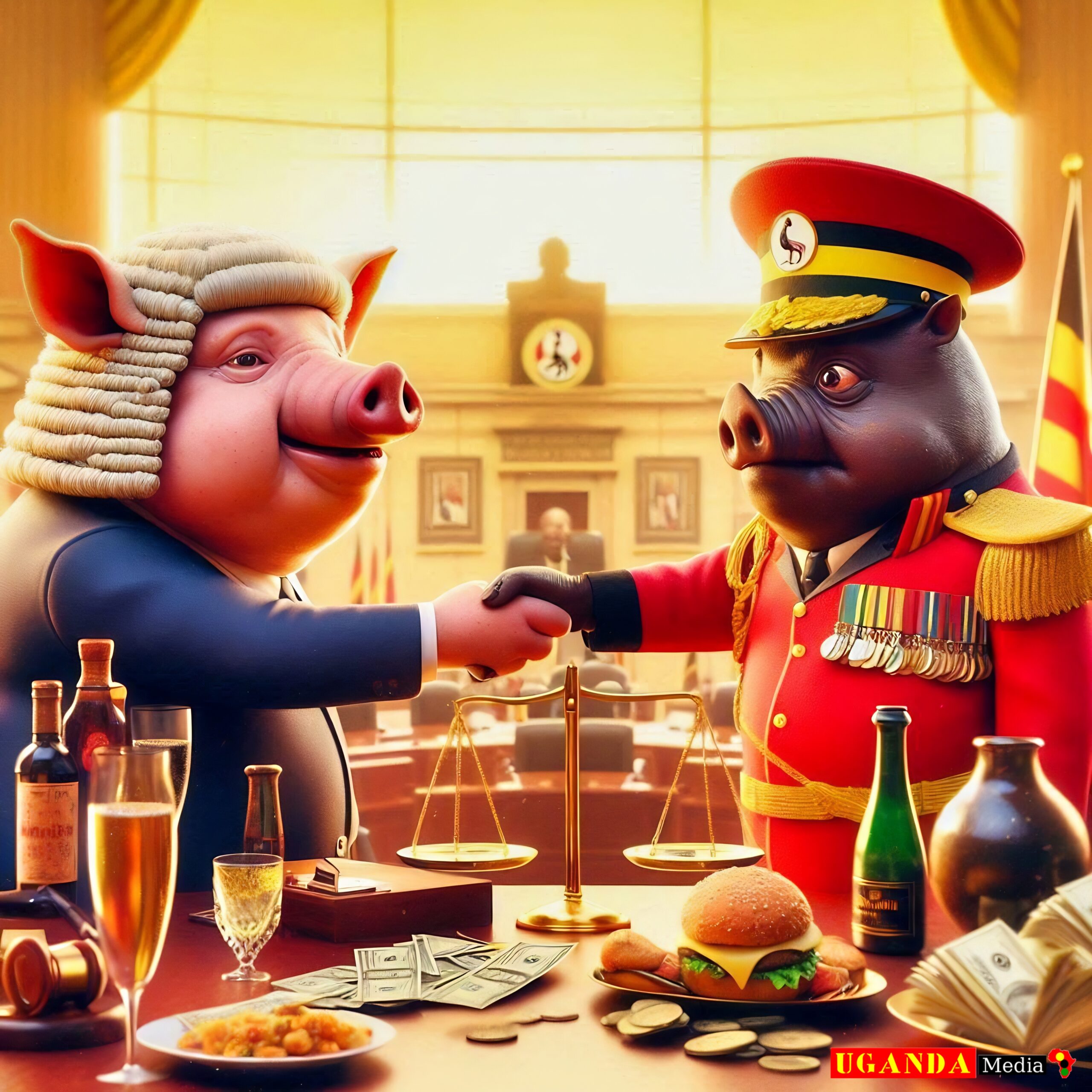
“This isn’t governance,” Isaac muttered under his breath, his hands trembling as they hovered over the keyboard. “This is theft.”
With a mixture of fear and resolve, he inserted a USB drive into his computer. One by one, he copied every incriminating document onto the device. Names, amounts, dates—all laid bare for the world to see. By dawn, Isaac was gone, leaving behind only the faint echo of footsteps and the ghostly hum of fluorescent lights.
An Exposé That Shook the Nation
The exposé hit Kampala like a thunderclap. Headlines screamed across newspapers, television screens flashed damning details, and social media erupted with outrage. “Every MP Took Bribes!” blared the front page of Free Uganda critical media. Below, the headline was a meticulous breakdown of who received what, accompanied by screenshots of bank transfers and handwritten notes scrawled in the margins.
For ordinary Ugandans, the revelations confirmed their worst suspicions. They had always known their leaders were corrupt, but seeing the evidence laid out so starkly was gut-wrenching. Conversations buzzed everywhere—in marketplaces, churches, classrooms, and roadside bars—as people pored over lists of names, pointing fingers at those they had once trusted.
“This is madness!” Auntie Rose declared at her chapati stall, waving a crumpled newspaper at anyone within earshot. “These MPs are worse than locusts! At least locusts leave something behind!”
Her customers nodded grimly, though some couldn’t help but chuckle at her theatrics. Humour, after all, was how many coped with despair.
Hope Ignites—and Fizzles
In the days following the leak, hope flickered like a fragile flame. Investigations were launched; commissions formed. Prominent figures vowed to hold wrongdoers accountable. Even President Museveni issued a rare statement condemning corruption, though sceptics noted its convenient timing.
“We must root out this cancer,” he declared during a televised address, his tone grave yet unconvincing. “No one is above the law.”
But as weeks dragged on, reality set in. Powerful men whispered in shadowy corners, striking deals to shield themselves from scrutiny. Arrest warrants were issued—but never executed. Investigators mysteriously disappeared or resigned under pressure. Justice evaporated like morning mist, leaving behind only disillusionment.
Isaac’s fate remained unknown. Some claimed he fled the country, seeking refuge abroad. Others whispered darker tales, suggesting he’d been silenced permanently. Either way, his courage became a legend, a symbol of resistance against overwhelming odds.
A Nation Awakens
Yet amidst the despair, something remarkable happened. Across Uganda, grassroots movements sprang up like wildflowers after rain, united by a shared vision of accountability. Artists painted murals on crumbling walls, depicting MPs as hyenas feasting on carcasses while ordinary citizens starved. Musicians composed songs decrying corruption, their lyrics sharp and biting:
“They steal our dreams, they sell our land,
While we sleep hungry, empty-handed.
But the truth will rise, the truth will sing,
And justice shall wear the crown of kings.”
Even comedians joined the fray, using humour to expose the absurdity of it all. At comedy clubs and roadside performances, audiences roared with laughter—and anger—as jesters mocked MPs’ greed.
“What do you call an MP who takes Shs 100 million?” one comedian asked, pausing dramatically for effect. “A professional beggar!”
The punchline drew applause, but beneath the laughter lay a simmering rage. People weren’t laughing because it was funny—they were laughing because it hurt too much to cry.
The Power of Art
One mural, painted on the side of a derelict building in Freedom Square, captured the nation’s imagination. It showed a towering tree with roots shaped like dollar signs, its branches weighed down by fat, bloated hyenas. Beneath the tree stood skeletal figures representing ordinary Ugandans, reaching desperately for fruit that remained perpetually out of reach.
Above the scene, bold letters spelled out a haunting message: “Who will water the tree of justice?”
The artist, a young woman named Nakato Akello, became an overnight sensation. Journalists sought her out, eager to capture her thoughts on the growing movement. When asked why she chose such a provocative image, she simply shrugged.
“I wanted to show the truth,” she said, her voice steady despite the cameras trained on her. “Our leaders have turned our country into a giant ATM. But trees don’t grow from money—they grow from soil, sweat, and sacrifice.”
Her words resonated deeply, inspiring others to take action. In schools, teachers incorporated discussions about corruption into their lessons. In villages, elders gathered children around fires to tell stories of integrity and resilience. And in cities, activists organized rallies, demanding transparency and reform.
The Shadows Strike Back
But not everyone welcomed the awakening. As momentum built, so did resistance. Anonymous threats flooded social media platforms, targeting artists, musicians, and activists alike. Graffiti calling whistleblowers traitors appeared overnight, defacing public spaces. Police cracked down on protests, arresting organisers and dispersing crowds with tear gas.
Despite the crackdown, defiance persisted. Protesters began wearing masks painted with hyena faces, turning intimidation into symbolism. Songs critical of the regime went viral online, their melodies echoing through streets and alleys. Even graffiti took on new meaning, transforming urban landscapes into canvases of dissent.
“They can erase paint,” Nakato Akello remarked during an interview, gesturing toward a freshly scrubbed wall where her mural had once stood. “But they cannot erase memory. Once you’ve seen the truth, you can’t unsee it.”
A Fragile Light
By year’s end, the battle lines were clear. On one side stood the entrenched elite, clinging to power through manipulation and force. On the other stood ordinary Ugandans, armed with little more than determination and creativity. Between them stretched a chasm of mistrust and inequality, widened by decades of neglect and exploitation.
Yet amid the darkness, moments of light emerged. A group of students raised funds to repair a pothole-ridden road in their neighbourhood, refusing to wait for government intervention. A farmer donated part of his harvest to feed families affected by drought. A teacher walked miles each day to ensure her pupils received an education, even when textbooks were scarce.
These acts may have seemed small, insignificant compared to the grand schemes of politicians and power brokers. But they carried weight, reminding Ugandans of what truly mattered: community, compassion, and courage.
Epilogue: The Tree of Justice
As Nakato Akello stood before the remnants of her mural, now reduced to smudges of paint and fading outlines, she allowed herself a moment of reflection. Her hands were stained with colour, her face streaked with sweat, but her spirit burned bright.
“The tree of justice doesn’t die easily,” she murmured, tracing the outline of a root with her finger. “Even when they cut it down, seeds remain. And someday, those seeds will sprout again.”
Behind her, Kampala pulsed with life—chaotic, resilient, beautiful. Somewhere in the distance, a song drifted on the wind, its melody carrying both sorrow and hope. Nakato smiled faintly, knowing the fight was far from over. But for now, that fragile light was enough.
Epilogue: The Legacy
The Uneasy Rhythm of Survival
By year’s end, life in Uganda had settled back into its familiar, uneasy rhythm—a precarious dance between resilience and resignation. Museveni remained firmly entrenched in State House, his grip on power as unshaken as ever. Parliament continued to function as little more than a rubber stamp for the regime’s excesses, passing budgets laced with kickbacks while MPs lined their pockets with impunity. Corruption wasn’t just tolerated; it was normalized, woven so deeply into the fabric of governance that few dared question it any more.
Yet beneath this veneer of stability, something stirred—something quiet but insistent, like the first tremors of an earthquake yet to come. Seeds of change had been planted, scattered by whistleblowers, artists, activists, and ordinary citizens who refused to accept the status quo. Though progress seemed painfully slow, hope lingered like embers smouldering after a firestorm, waiting for the right wind to reignite.
Sarah Namutebi: A Beacon of Resistance
Among those leading the charge was Sarah Namutebi, whose fiery speeches at Freedom Square had transformed her from an unknown activist into a household name. Her voice carried across Kampala—and beyond—as she rallied thousands with calls for accountability and justice. She had become a symbol of defiance, her face plastered on posters and murals alongside slogans like “No More Thieves!” and “Our Future Is Not For Sale.”
But fame came at a cost. Death threats arrived daily, some anonymous, others chillingly specific. Police routinely disrupted her rallies, dragging protesters away in handcuffs. Yet, Sarah refused to be silenced. If anything, adversity only steeled her resolve.
“They think they can break us,” she declared during one particularly heated rally, standing atop a rickety podium surrounded by cheering supporters. “But let me tell you something—they are wrong! We may fall today, but we will rise tomorrow. And when we do, they’ll wish they’d listened.”
Her words resonated deeply, inspiring young Ugandans to take up the mantle of resistance. Students organized teach-ins at universities, discussing strategies for reform. Tech-savvy youth launched online campaigns, using memes and viral videos to expose corruption. Even in rural villages, elders gathered children around fires to share stories of courage and integrity, planting seeds of rebellion in fertile minds.
Dr. Adonyo: Mentor to the Next Generation
For Dr. Lumumba Adonyo, the ill-fated MP from Palabek South, the scars of betrayal ran deep. After being forced to apologise publicly for calling out corruption, he retreated from politics, disillusioned and broken. But though his spirit had been battered, it had not been extinguished.
In time, he found solace in mentoring the next generation of leaders—young men and women eager to learn from his mistakes and triumphs alike. He hosted informal gatherings in his modest home, sharing stories of battles fought and lessons learned. His advice was simple yet profound: “Never trade your principles for prosperity. Integrity is the foundation of true leadership.”
One of his protégés, a bright-eyed law student named Annet Nakintu, took these words to heart. Inspired by Dr. Adonyo’s courage, she began documenting cases of corruption in her community, compiling evidence for future legal challenges. When asked why she persisted despite the risks, her answer was unwavering: “If we don’t fight now, who will? If not today, then when?”
Wilfred Niwagaba: A Glimmer of Belief
Even Wilfred Niwagaba, the perpetually rumpled Shadow Attorney General known for his biting critiques of the regime, allowed himself a rare moment of optimism. Over coffee at his favourite dingy café, he reflected on the changes unfolding around him—not dramatic upheavals, but subtle shifts in attitude.
“Young people are waking up,” he mused, stirring sugar into his mug until the liquid turned murky brown. “They’re realizing that this system isn’t inevitable. It can be changed—if enough of them stand together.”
He paused, glancing out the window at Kampala’s chaotic streets. Boda-boda riders zipped through traffic, vendors hawked mangoes and roasted maize, and children played football amidst puddles left by afternoon rains. Life went on, oblivious—or perhaps indifferent—to the moral decay festering inside Parliament’s marbled halls.
“And maybe,” he added softly, almost to himself, “just maybe, justice might prevail someday.”
Dictator Museveni’s Legacy: The Era of Looting
As for Dictator Museveni, his legacy loomed large over Uganda—but not in the way he might have envisioned. History would remember him not as the liberator who ousted Idi Amin’s brutality or the Rwandese parasite who brought genocide and criminality to a fractured nation. Instead, his name would be synonymous with an era when looting became normalized, when public coffers were treated as personal piggy banks, and when power was wielded less as a responsibility than as a weapon.
Yet even as critics condemned his methods, they could not deny his cunning. Dictator Museveni understood human nature better than most: greed trumped morality every time. By fostering dependency, exploiting divisions, and manipulating fear, he ensured loyalty—even if it came at the expense of dignity.
But legacies are shaped not only by rulers, but also by those who resist them. And in Uganda, whispers of rebellion grew louder with each passing day. Protest songs blared from roadside bars, murals depicting hyenas feasting on carcasses adorned crumbling walls, and comedians used satire to expose the absurdity of it all.
A Whisper That Refuses to Die
In the end, Dictator Museveni’s greatest failure was not his inability to eradicate dissent—it was his underestimation of its power. What began as isolated acts of resistance blossomed into a movement, united by a shared vision of accountability and justice. Ordinary Ugandans, long accustomed to suffering in silence, discovered strength in numbers and courage in collective action.
And perhaps that was the most poignant irony of all. For decades, Dictator Museveni had sought to divide Ugandans along tribal, regional, and ideological lines. Yet in doing so, he inadvertently forged a new identity—one rooted not in differences but in shared struggles against oppression.
As night fell over Kampala, casting long shadows across its chaotic streets, a faint whisper echoed through the darkness. It was a whisper of rebellion, fragile yet persistent, carried forward by those who dared to dream of a better future.
“No more,” it said. “No more thieves. No more lies. No more silence.”
And perhaps, just perhaps, that whisper would grow louder still—until it drowned out the noise of corruption, division, and despair. Until it became a roar that no amount of force could silence.
Final Thoughts: The Dawn of Change
Uganda stood precariously balanced between hope and resignation, progress and decay. Its fate rested not in the hands of its leaders but in the courage of its citizens. Whether they would rise up or remain silent spectators to their undoing remained to be seen. One thing was certain, however: the legacy of Dictator Museveni’s era would not be defined solely by the wealth he amassed or the power he wielded. It would also be remembered as the time when ordinary Ugandans rose to say: No more.
And in that refusal lay the promise of transformation—a reminder that even in the darkest of times, light could still find a way.
Sub delegate
Joram Jojo
- Beyond National Unity Platform (NUP): Building Real People Power in Uganda from the Ground Up - 3rd September 2025
- Red Beret Messiah or New Dictator? Anarchist Critique of Bobi Wine Cult & NUP Cronyism in Uganda - 17th August 2025
- Uganda’s NDPIV Unmasked: The Stark Reality Behind the Illusion of Progress - 8th June 2025























